By Georgios Kalafikis, Ph.D.
Along with its claims in the Aegean during the last decade, Turkey has invested in the so-called “Kastellorizo paradox” on the assumption that it constitutes the “Achilles’ heel” of Greece. Accordingly, Turkish officials have formulated and circulated a theory about the minimal or zero effect of the Kastellorizo cluster of islands and islets upon a possible delimitation of maritime zones and the Exclusive Economic Zones (EEZ) of Turkey and Greece. Unfortunately, the main points of the Turkish arguments remain unanswered by the Greek side, as if Greeks feel somewhat “uneasy” about the supposedly “extraordinary case” of Kastellorizo. The Turkish arguments mainly revolve around the following claims, which are prone to sound objections by competent counterarguments so that they can be suitably disproved or even completely neutralized:
1) “Concerning the sharing of maritime zones (continental shelf and EEZ) and the delimitation of sovereignty (territorial waters), Greece behaves like a maximalist”. Greece’s alleged “maximalism” is ideally based on the internationally accepted and legally established methods of median lines and equidistance. On the contrary, Turkey’s “maximalism” is based on a hyperbolic distortion of the legal concept of equity. According to the Turkish misconception about “equity”, the massive land mass of Anatolia combined with the big population of Turkey should impose the shrinking of the potential Greek EEZ in the Aegean to the west of the 25th meridian, as well as the restriction of the Greek islands in the central and the Eastern Aegean only within a minimum territorial sea of six miles. According to Turkey’s delusion, the EEZ between Greece and Turkey must be demarcated from their respective mainland shorelines! Thus, the Turkish side attempts to completely neutralize the effect that hundreds of Greek islands in-between mainland Greece and Turkey exercise upon the delineation of the maritime zones between the two countries.
However, the minimal or zero effect of the projection of the Greek island coastlines compared to the Turkish mainland shoreline is erroneous. The potential effect of the Aegean Greek islands adjacent to Turkey cannot be easily minimized or nullified. In this way, Turkey’s 0%, apart from being arbitrary even by “equity” standards, is far more maximalist than Greece’s 100%, which solely but perfectly abides by the “equidistance” standards. The unlikely possibility of such a misapplication of the relevant International Law absolutely in favor of Turkey would mean the complete nullification (!) of the potential continental shelf and the EEZ of not just an island, nor even an archipelagic cluster of islands but two entire countries – Greece and Cyprus – in every case their coastline is adjacent to the Turkish one.
On the contrary and quite indicatively, the maritime zones of the USA with Cuba and the Bahamas, or between Cyprus and Egypt, or even between Turkey and the Soviet Union were solely demarcated by “median lines” and “equidistance”. The difference in the size between the above contracting countries is and, respectively, was far greater than the difference in size between Greece and Turkey; still, this was not a problem for “equidistance” and “median lines” to be accepted by those “bigger countries” and, thus, to apply to such “uneven” cases with so much “smaller” neighboring countries.
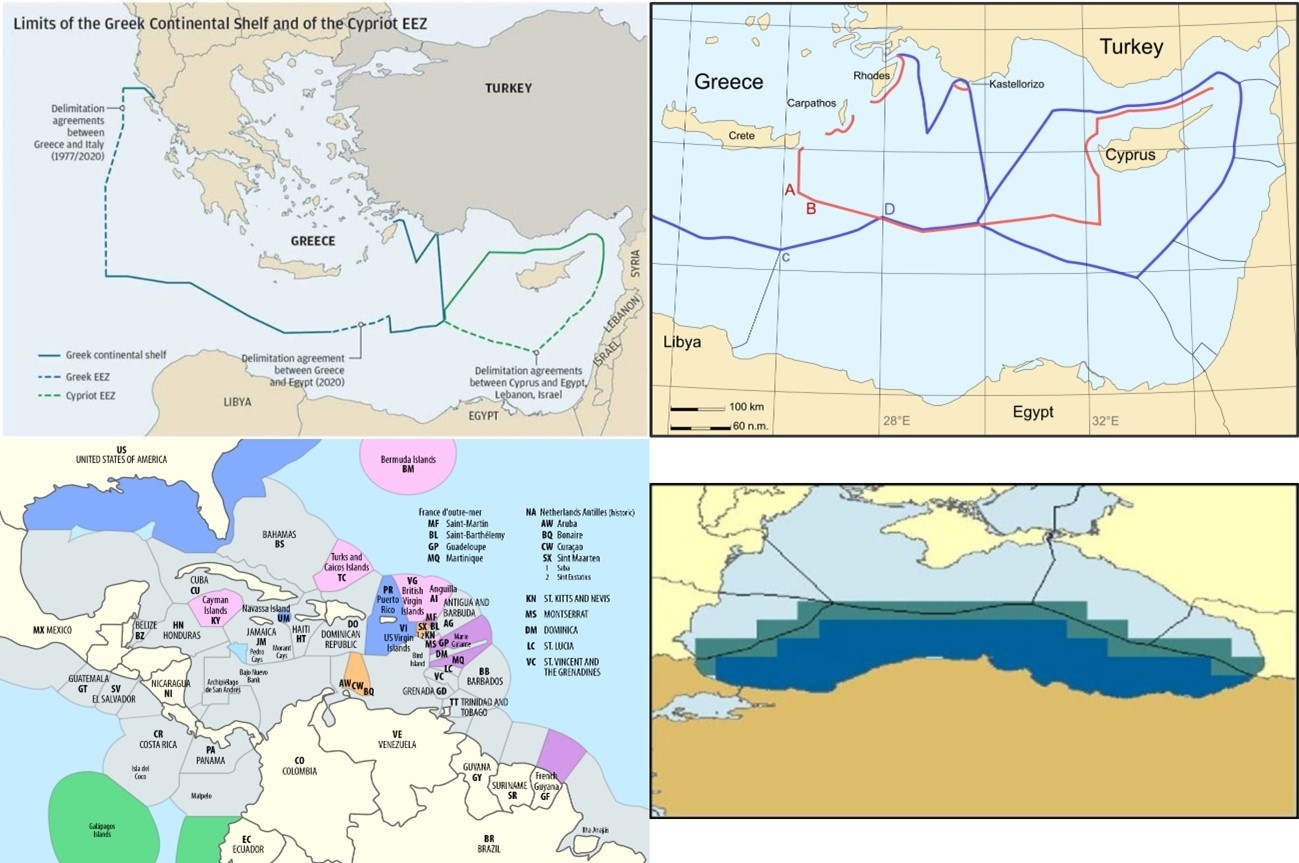
However, now Turkey completely rejects those methods for delimiting its maritime zones with Greece because supposedly Greece is a “small” whereas Turkey is a “big” country! By resorting to double standards for the same issue, Turkish officials only manage to negate themselves. However, “equidistance” and the “median lines” have been only partially applied to the recently limited Greek-Egyptian EEZ agreement (45% – 55%, in respect). Egypt pressed on Greece’s need for a swift solution, exploited it, and took advantage of it to the detriment of the Greek side because the expansionist Turkish claims already unfolded in practice against both Greece and Cyprus.
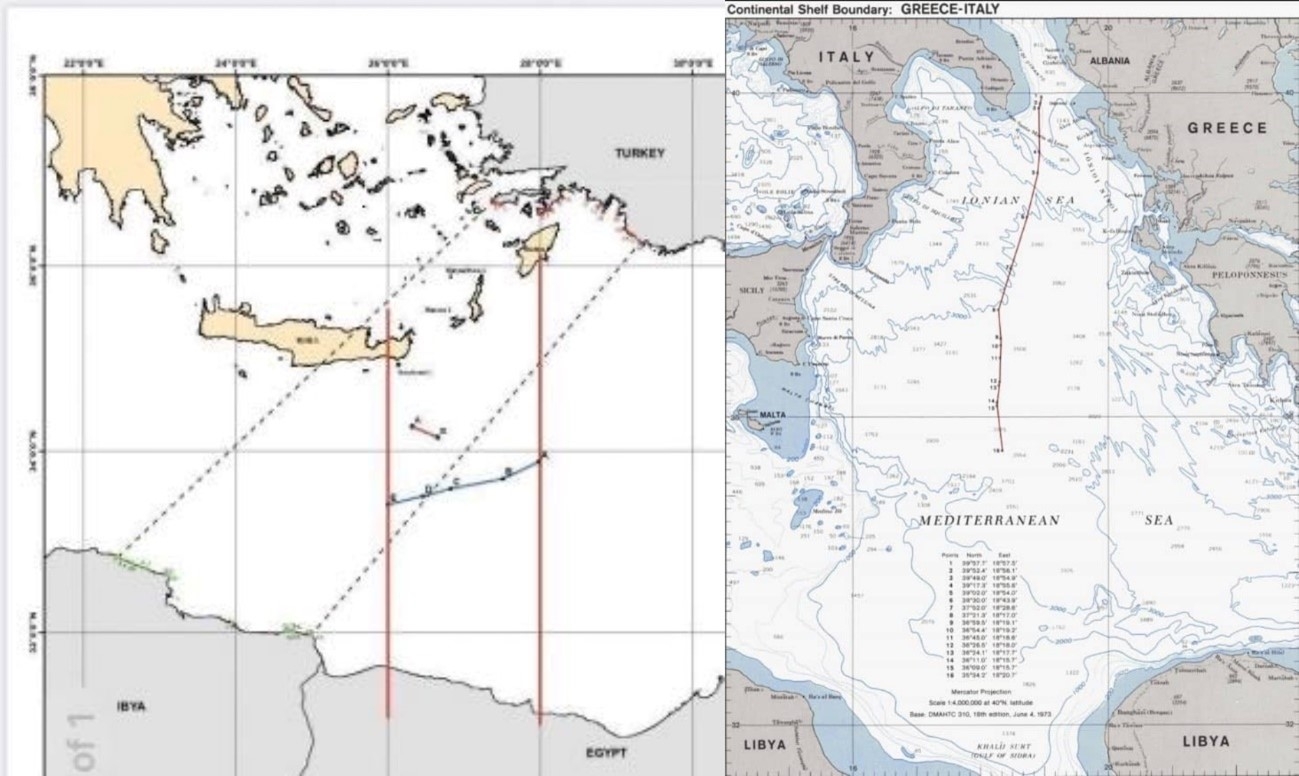
2) “By far, Turkey possesses the largest (continental) shoreline in the Mediterranean Sea; therefore, Turkey should be proportionally given a larger share of EEZ compared to neighboring Greece”. That’s a lie: The Mediterranean coastline of Greece (13.500-15.000 km overall; ca. half of it, 7.500 km, continental) is at least twice as big as Turkey’s (7.200-8.000 km in overall; ca. 4.000 in the Mediterranean and the Aegean). By far, Greece owns the longest coastline in the Mediterranean and the eleventh-largest in the world. So, what’s the point of such Turkish myths circulating internationally? This Turkish fabrication is a journalistic type of propaganda, but additionally, it seeks legitimacy based on “proportionality”. According to this latter legal principle, Turkey putatively deserves an extensive EEZ in the Mediterranean due to its extensive coastline. This pseudo-argument can be conveniently rebutted by the Greek side through the unambiguous, though unpleasant for Turkey, verity: it’s simple enough to manifestly point out that the Greek coastline is at least twice as big as its Turkish counterpart. Correspondingly, Greece is entitled to a greater EEZ than Turkey even by applying the principle of “proportionality”.
3) “Kastellorizo is just a tiny cluster of islets of approximately 10 sq. km. somewhere in the Eastern Mediterranean far away from the Aegean but in excess Greece claims about 40.000 sq. km. of EEZ; however, Kastellorizo should not be taken into account in the delimitation of the maritime zones and the EEZs in the Eastern Mediterranean because it is a distinct, extraordinary and isolated case”: with this legalistic argument, Turkey not only separates Kastellorizo from all other Greek islands but also the Aegean as a whole from the Eastern Mediterranean! However, the Aegean Sea together with its islands belongs to the Eastern Mediterranean Sea. For example, all terms that describe the sovereignty of the islands in the Aegean Archipelago, especially those in the Eastern Aegean, explicitly refer to “the islands of the Eastern Mediterranean” (cf. the 1923 Treaty of Lausanne). The small island complex of Kastellorizo belongs to the large Greek island group of the Dodecanese, both geographically and administratively. In our opinion, the coastline of the Kastellorizo islets should be included and added, not isolated, separated, or even omitted from the overall coastline of the Greek islands, especially as far as the Greek opposing or adjacent coastline might be compared to its Turkish equivalent for the delimitation of the Greek and Turkish maritime zones.
4) “Kastellorizo is a far-away and a cut-off Greek island only 2 km away from mainland Turkey, whilst 570 km away from mainland Greece (Piraeus)”. That’s another arbitrary and false inaccuracy deliberately made by the Turkish side to emphasize the “remoteness” of Kastellorizo with the rest of Greece. However, one should first calculate the distance of every single Greek island not to that of mainland Greece but the neighboring Greek island(s) immediately next to it. (Thus, every Greek island ultimately serves as a “bridge” between each other and mainland Greece. That’s why another Greek word for the “sea” is “sg. pontos, gen. pontou”; cf. the Latin equivalent word of “sg. pons, gen. pontis”, “bridge” in English. For Hellenism, from Antiquity till today, the sea and the islands in-between have always served as “bridges” of communication). So, the closest Greek island to Kastellorizo is Rhodes 125 km. afar.
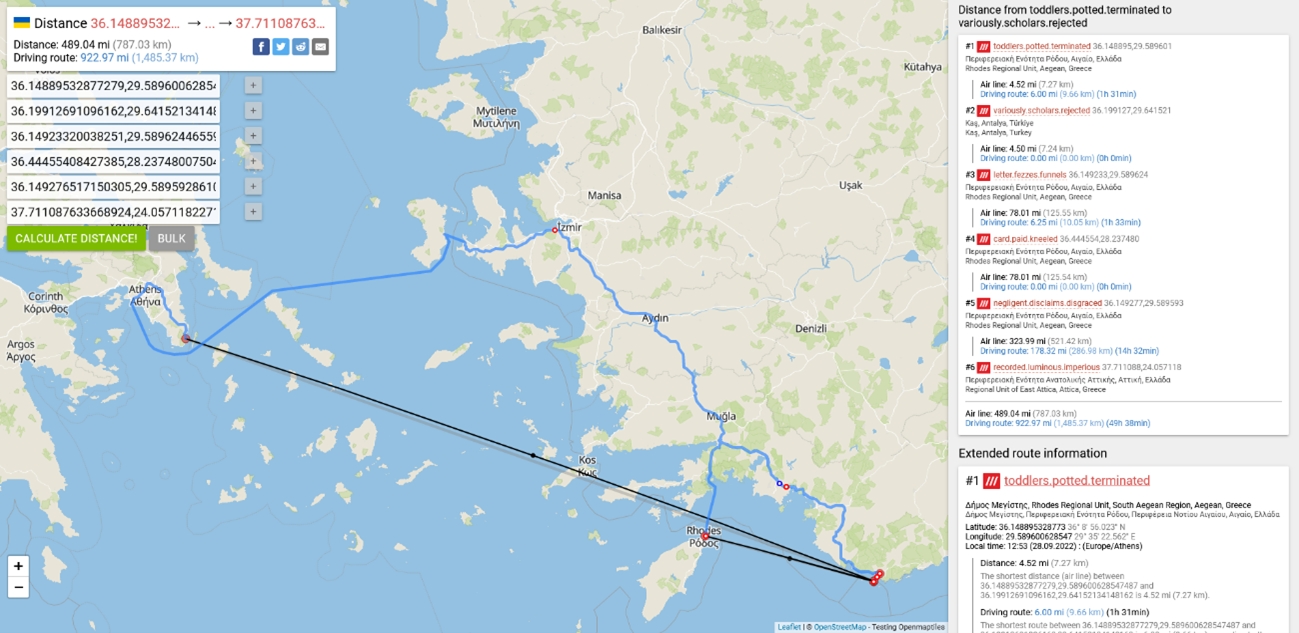
Likewise, in analogy to Kastellorizo, the Straits between Samos and mainland Turkey are only 1,5 km in length, while the distance between the cities of Samos (Vathy) and Kuşadası in Turkey is 28 km, between Samos (Vathy) and the port of Lavrio in Attica, mainland Greece is 255 km.
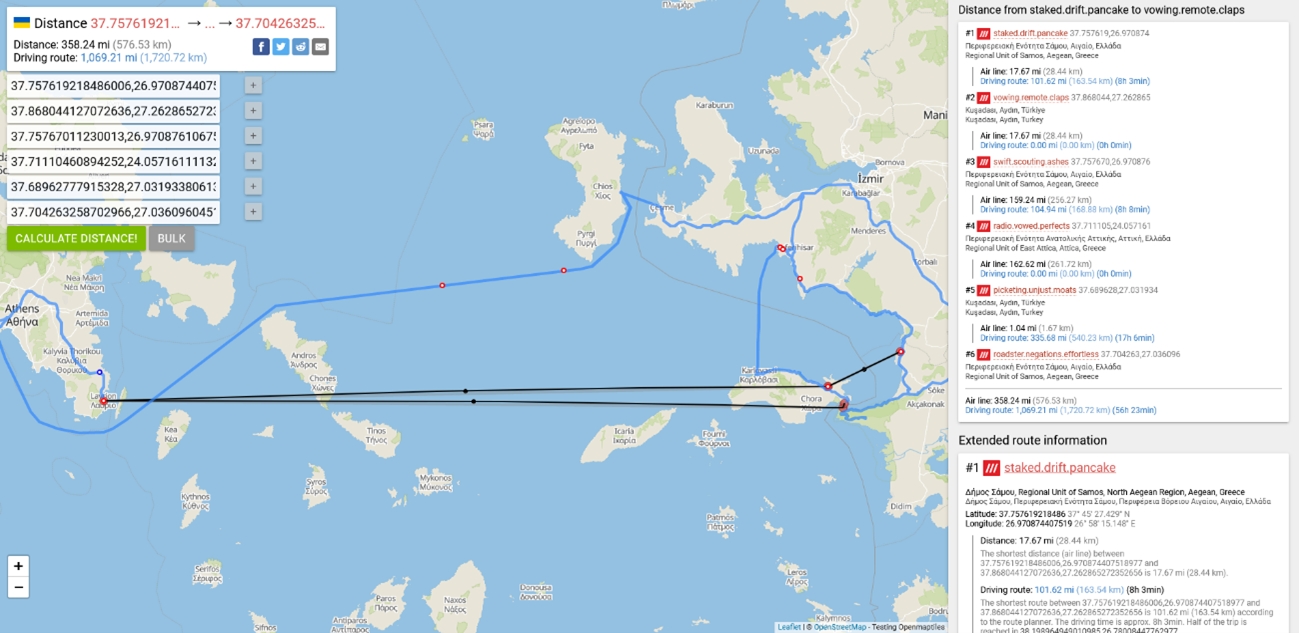
So, do these facts make Kastellorizo or Samos isolated and “trivial” regions of Greece not eligible for an EEZ, especially when compared to the very close Anatolian landmass of Turkey? Not! Greece forms a joint land-and-sea territory of ca. 370.000 sq. km (ca. 130.000 sq. km. of the mainland and 240.000 sq. km. of the Aegean Sea basin) because of its geomorphology; Greece is inseparably encompassed by both land and sea owing to the existence of almost 6.000 islands, islets, and rocky islands, widely scattered over the Mediterranean basin. The Kastellorizo complex locates at the extreme southeastern corner of all other Greek island clusters in the Aegean/Eastern Mediterranean Sea.
Things in serious diplomatic negotiations and talks, as well as in trivial everyday discussions, turn rather simply and relatively determined with almost mathematical precision: as long as one side lowers its bar of demands (Greece), while the other one maintains its bar to the maximum or even increases it (Turkey), so the first side reduces its own desired objectives and minimizes the potential profit, whereas the second one increases and maximizes them! As it is easily understood, exhortations such as “let us, Greeks, not be lone-eaters and greedy” do not help at all – from the beginning and in principle – neither at the start nor the conclusion of the negotiations with such opponents, who almost demand from the Greeks to surrender to them “earth and water”, roughly as the Persians wished 2.500 years ago.
With their aggressive propaganda, revisionist claims, and military threats, Turkish officials prove that, when they signed the Treaty of Lausanne in 1923 and renounced almost all territorial sovereignty in the Aegean (which belongs to Greece except for Imbros, Tenedos, and the Rabbit Islands), they succumbed in doing so because they had no other choice since they were obliged to ensure and secure Turkey’s territorial sovereignty in Anatolia and Eastern Thrace. Back then, the status quo and the situation in the Aegean probably didn’t bother them.
However, from then on and during the following decades, the International Law, and especially the Law of the Seas, evolved dramatically to the detriment of Turkey’s national interests and in favor of Greece’s sovereign rights to such an extent that the initially simple territorial sovereignty of Greece in the Archipelago (from 1947/48 supplemented by the incorporation of the Dodecanese and Kastellorizo) may now, legally and thanks to its widely scattered territorial possessions (namely the islands) in this entire sea basin, be transformed into an almost complete parallel maritime sovereignty in the Aegean, through the gradual expansion of the territorial waters, through various means provided by the UNCLOS, and, of course, ultimately through the declaration of the Greek EEZ across the whole length and breadth of the Greek seas.
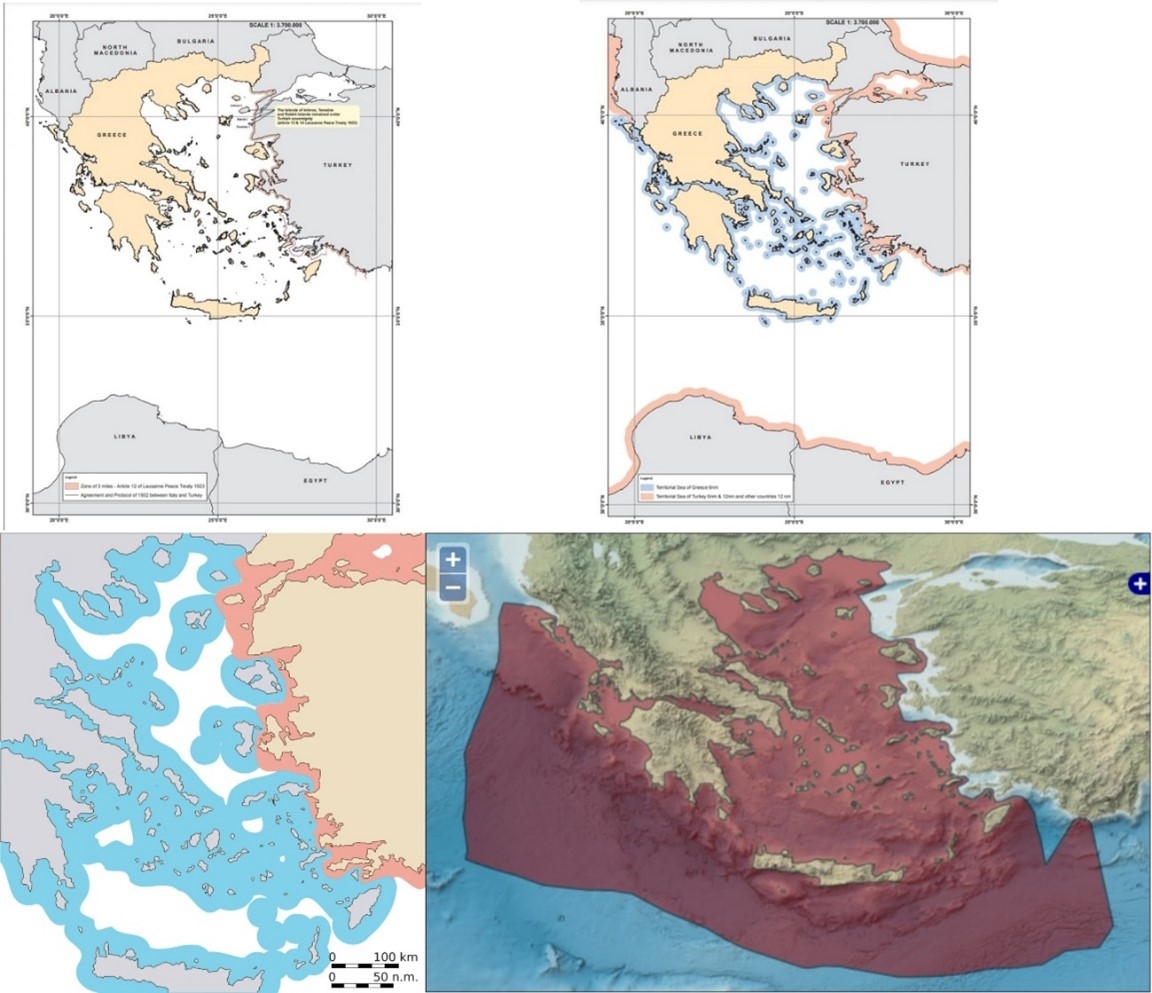
That’s why, when the Turkish leaders finally came to understand that the international developments and jurisprudence had already begun to turn so much to Greece’s favor, especially with sovereignty rights in the Aegean Sea, they reacted by circulating their first counterarguments and objections as early as the end of 1973. Since then, Turkey has never ceased to escalate its threatening and expansionist claims against Greece, moving from the declaration of the illegitimate casus belli (1995) toward the recent (2019) doctrine of the “Azure Homeland” (Mavi Vatan), which the Turkish leadership will surely keep on maintaining in the future as the guiding instrument and compass for their foreign policy and strategy.
We believe that the Greek side could perhaps exploit in its favor through a “creative osmosis” two seemingly contradictory facts, namely the unlawful Turkish war threats and the legitimate provisions of UNCLOS to turn the status quo in the Aegean in its favor without departing at all from the current established rule of the 6-nautical-miles radius. A window of opportunity still exists as long as we recognize it and want to take advantage of it. Occasionally, the Greek side should resort to “out of the box” initiatives, as Greece has already done by signing mutual defense pacts with Great Powers, such as France, a NATO ally, EU partner, and long-standing friend of our country.
In this article we pointed out, explained, and hope to have refuted, albeit in short and as a non-expert, the key Turkish allegations against the Greek position on the above issues. In any case, Greek officials should always be ready and on alert to answer and disprove such allegations by their Turkish counterparts. This again-inflamed Greco-Turkish confrontation is not only a matter of diplomacy, politics, grand strategy, military force, or international law; it’s also a matter of logic, publicity, internal and external legitimation, as well as truth.
An even more dynamic reaction is required, not only for the eyes and ears of the world but also as deterrence to Turkey. There are limits to the appeasement of Turkey. I am not so sure about Turkey and the Turks, but certainly Greece and the Greeks want peace though not “peace at any price”. Greece has no reason to (and actually does not) provoke Turkey at all, but should Greece be unjustly provoked by Turkey (as so frequently happens), then Greece should respond quickly and react appropriately, either in brief or in detail, but reasonably and comprehensively. Nobody may blame the Greek side for “fighting fire with fire”, because that’s what the Turkish side does with its persistent, inflammatory statements and actions.
Unfortunately, the bilateral Greek-Turkish relations have already reached an almost all-time nadir and are virtually in a “coma” for a dangerously long period. On the one hand, Turkish revisionism has reached its zenith, so Turkey cannot renounce it because that would eventually turn into a “national setback”, while on the other, Greece cannot afford to back off without first laying down sovereign rights or even territory and thus suffer a “national catastrophe”. The current deadlock is pretty obvious. Fortunately, Greece belongs to NATO and the EU, otherwise, Turkey might have already attacked and invaded Greece. A “safety valve” is still missing though much needed for defusing the tension between the two countries and for a way out of this crisis. At least, let us hope that the present Turkish frenzy will turn out to be temporary and may not lead to other types of extremities, or else both neighboring peoples, Greeks and Turks alike, will surely and inevitably suffer a lot. Turkey’s propaganda, belligerent statements, and expansionist claims against Greece have almost exceeded in frequency and sharpness all analogous contentions of Italy before the infamous Italian invasion and the 1940 war!










